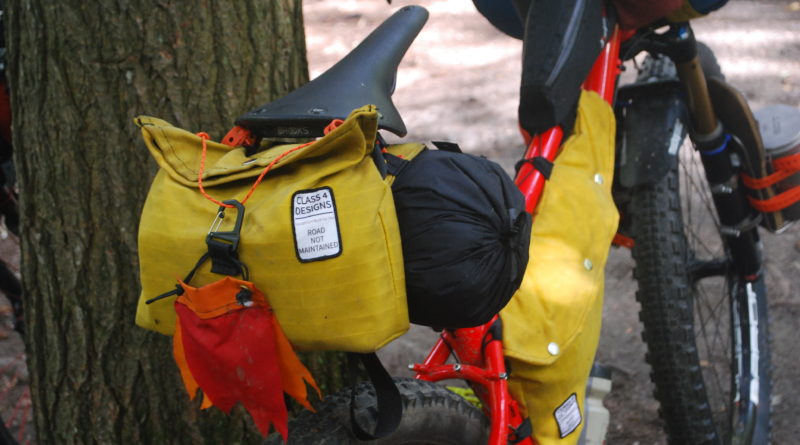Custom Packs, Made in Vermont
Can’t find the perfect pack for your camping trip, bikepacking adventure or fly-fishing foray? That’s the problem that climber John Campbell, cyclist Aaron August, and fishermen Ryan McDonald and Jake Sienkewycz were facing. So, true spirit of entrepreneurs, they started making their own packs and selling them.
The result is that here in the Green Mountains you can get a custom pack made for just about any adventure you can dream up.
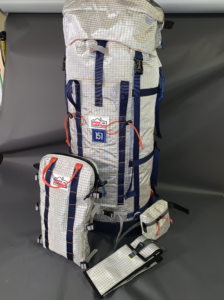 Alpine Luddites: Custom Backpacks for Everest and Beyond
Alpine Luddites: Custom Backpacks for Everest and Beyond
John Campbell began doing hikes on the Long Trail when he was only seven years old. Raised in Connecticut, he spent summers camping in a canvas tent on land his parents owned in Cabot, Vt. At the age of 16, he did a 5-week NOLS course in the Chugach Range of Alaska. A year later, he did a month-long climbing trip in the Andes. All of this before the age of 18.
From an early age, Campbell, now 51, knew what he wanted from a backpack. “I didn’t think a lot of what I saw on the market really fit the need, even back then,” remarked Campbell. Many companies were focused on backpacking and mountaineering packs that had one-size-fits-all harnesses and oversized hip belts. According to Campbell, JRAT and Wild Things were some of the only companies making quality technical packs. Inspired by these brands, he decided to start making packs and gear himself using his mother’s Singer Sewing machine. “You know, I just did my own thing. I’m a very big believer in do it yourself.”
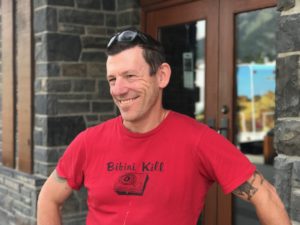
Eventually, Campbell found himself sewing packs at Dana Designs, now Mystery Ranch, full time in Bozeman, MT. He would go on to work in sales for companies such as Cloudveil Mountain Works, Sterling Rope Co., Genuine Guide Gear, and Macpac Wilderness Equipment. During that time, he was able to visit factories in China and see how many packs were made.
In 2013, while living in Ouray, Co. Campbell launched his own brand, Alpine Luddites. “You know, a lot of people construe Luddites to be anti-technology,” explains Campbell. “In reality, the Luddites were fighting the onset of the Industrial Revolution in England that was destroying home lives, making people work in factories, paying them really low wages, really horrible living conditions, and building really crap products.” At Alpine Luddites, Campbell handmakes an extensive range of bikepacks and backpacks.
In December 2020, Campbell and his wife moved to Island Pond. In addition to running Alpine Luddites, Campbell has been teaching an outdoor gear design class at Sterling College.
Campbell makes custom gear that is meant to last forever. Even the packs that Campbell does not deem, ‘full-custom’, are personalized to each customer: You can spec everything from back lengths, to hip belts, to shoulder straps, to split sleeves, to colors of the Dyneema fabric he uses. You can ask for rolltops, drawcords, the list could almost go on forever. Campbell is a mad scientist of packs. ‘Standard’ is likely not even in Campbell’s vocabulary. If your hip belt doesn’t fit right, no problem, he’ll take care of that free of charge. As Campbell says, “It’s part of what you’re paying for.”
What sets Campbell’s custom packs apart? Each customer goes through multiple phone consultations with Campbell and provides their dimensions. Depending on what the pack will be used for, some climbers prefer different lengths. For climbing, one might want a shorter pack, but for backpacking, prefer something a little longer. Special care is taken to make sure that the hip belts fit correctly and each pack is sewn to measure. Campbell requires a measurement around the waist at the hip bone, as well as at the actual waist. For bigger, 60 liter packs, over half of his customers are women who typically cannot find packs that provide a good fit. “The hip belts are conical in shape—wider at the bottom than the top so that you don’t really have to squeeze them real tight. They just sit on top of your pelvis,” explains Campbell.
Campbell handmakes all of his products (which range from alpine packs to bikepacking packs). “Every day I have new challenges,” says Campbell. “You know, 85 percent of my work is one-off, custom.” Since forming the company, Campbell has made around 1,000 packs that range in cost from $45 to $900. His packs range from 32 oz. Nalgene-sized water bottle pockets to handlebar bags for bikes to 70-plus liter packs and 135 liter expedition duffel bags.
Campbell’s customers range from professional climbers, cyclists, and guides, to newlyweds whose friends chip in to buy them heavily customized packs, to people who scrounge up every last nickel and dime they have in order to buy one of his creations. Alpine Luddites packs have summited Everest, climbed ice formations in the Taihang Mountains of China, and trekked across Scotland. But as Campbell puts it, “the things that make me feel the best is when I get emails from people that have not had a comfortable pack their whole career, and they get the pack that actually fits them.”
At Alpine Luddites, Campbell is the only employee, and because of this, wait times are typically around 6 months (currently 8 months). In the seven years that Campbell has been operating Alpine Luddites, only one pack has been brought back to him for a repair where it had been punctured by an ice screw. Campbell fixed it free of charge.
Class IV Designs: The Bikepacker’s Solutions
As with Campbell, Aaron August, 28, of Class 4 Designs in East Bolton, started out just making gear for himself and his friends. “I inherited my great grandmother’s sewing machine. She’s still alive, she just doesn’t sew anymore,” says August. “Then a fabric store back home in North Umberland, Pa., went out of business, and I picked up a bunch of stuff really cheap.” At first, August was making anything and everything people wanted, from made-to-fit camera bags to totes and bikepacks. He made his first frame bag in 2018. Eventually, more and more people kept asking him to make them gear and Aaron realized he had to account for some of his costs. From there, it grew into Class 4 Designs organically. Since its inception, August has focused the brand around a range of bikepacks.
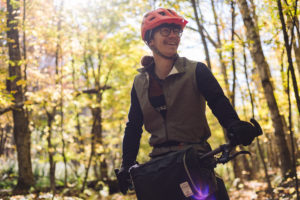
A former Boy Scout, August has been going into the wilderness since he was a kid, and has been working at Outdoor Gear Exchange in Burlington since 2016. His current position is Level 3 Service Technician and Demo Fleet Coordinator. August first started toying with equipment design after taking an entrepreneurship class in 2011 and even a bit before that when he would weigh all of his outdoor gear by grams. August really started to get into bikepacking about seven years ago, but before that he was heavily involved in backpacking—specifically, ultralight backpacking and long thru hikes including the Rayado Trek; a 21 day hike in New Mexico.
After being given an industrial sewing machine from a coworker at Outdoor Gear Exchange, August began expanding production, making more frame bags and his brand bags.
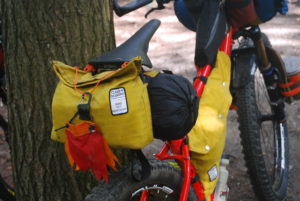 All of August’s bags are made to order. “I have a basic pattern that everything is modeled off. It’s one that I’ve tested and used and know works,” remarks August. “From there, the world’s your oyster. We can do anything and everything, from custom colors, to adding pockets, subtracting pockets, changing things… I just bring to the table that basic design concept and then from there, we can do whatever you want really.” Most of August’s bags are made from either X-Pac VX21 fabric or 10.10 oz. water repellent Army duck canvas.
All of August’s bags are made to order. “I have a basic pattern that everything is modeled off. It’s one that I’ve tested and used and know works,” remarks August. “From there, the world’s your oyster. We can do anything and everything, from custom colors, to adding pockets, subtracting pockets, changing things… I just bring to the table that basic design concept and then from there, we can do whatever you want really.” Most of August’s bags are made from either X-Pac VX21 fabric or 10.10 oz. water repellent Army duck canvas.
As with Alpine Luddites, the above service is not even the ‘full custom’ option. In addition to making frame bags, panniers, stem bags, and numerous other typical bikepacks, August will work with you to make whatever monster of a bag you have dreamed up. Some of his previous custom projects have included a stem-mounted camera bag, a truck-bed ski carrier, and a bike basket bag.
Currently Class 4 Designs focuses on bikepacks and totes, but August is experimenting with backpacks and ski packs. One standout is a ski vest that he previewed on the Class 4 Designs Instagram account. Though not available to the public yet, the prototype cleanly fits under a shell and has enough pocket space for just about anything you might need while on the hill. “I can carry a sandwich, beers, snacks, my multi tool, anything that I would need on a day to day basis,” says August. A prototype backpack of his will even be making a thru-hike on the Continental Divide Trail this summer.
One thing that makes Class 4 Designs special is August’s commitment to everything that comes with the world of bikepacking. “I went to Paul Smith’s College to be in a lifestyle business. That’s really what I’m all about,” says August. “I’m here in my cabin, in the middle of the woods, in East Bolton, on a dirt road. We can take your bag specs, we can get it built for you, you can come over, we’ll put it on your bike and we’ll go ride some Class Four roads and hang out. And that to me is much more important than making hundreds of thousands of bags.” What August enjoys most is the opportunity to be creative and build one-of-a-kind bags for one-of-a-kind people.
Finn Utility: A Fisherman’s Friend
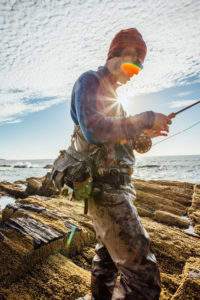 In Richmond, another pack maker is following in the tradition of handmade goods. Ryan McDonald, 45 and Jake Sienkewycz, 29, of Finn Utility are producing high quality, Vermont made, fly fishing bags, fly wallets, and other essential gear. After designing for different brands like Carhartt and Adidas, McDonald grew tired of the typical 9 to 5, stuck behind the constraints of a desk, and fell back on what he loved to do in his free time; fly fish. “You know, [now] I don’t have to be behind a desk and I get to go fly fishing,” remarked McDonald. He launched Finn Utility in 2013.
In Richmond, another pack maker is following in the tradition of handmade goods. Ryan McDonald, 45 and Jake Sienkewycz, 29, of Finn Utility are producing high quality, Vermont made, fly fishing bags, fly wallets, and other essential gear. After designing for different brands like Carhartt and Adidas, McDonald grew tired of the typical 9 to 5, stuck behind the constraints of a desk, and fell back on what he loved to do in his free time; fly fish. “You know, [now] I don’t have to be behind a desk and I get to go fly fishing,” remarked McDonald. He launched Finn Utility in 2013.
Most of the products are made with waxed canvas and English bridle leather. As McDonald puts it, “It’s really soft and durable. And, you know, a little bit water resistant. And if you take care of it, it lasts a long time.”
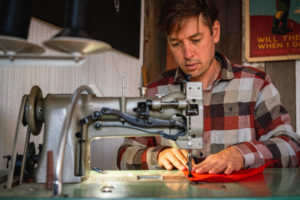
Finn’s Essex Side Bag is based off of McDonald’s grandfather’s fly bag; a World War II medic bag that he converted for fishing upon returning home from the war. “I always remember looking at it when I was a kid,” recalled McDonald. “That stuff was so awe inspiring at the time. And I guess I was just kind of revisiting that in a newer way.” The bag’s adjustable leather strap allows it to hang nicely on your hip. One large zipper pocket has space to fit fly wallets, reel cases, picnic supplies, or maybe even a couple of beers.
On the outside, the bag features a rod holder loop, pouch pocket, two side pockets, and lots of convenient places to clip your floatant holder. The bag also comes with Finn’s tippet sling, fly-dry patch, and floatant holder. These subtle add-ons all appropriately have the ability to clip onto the outside of the bag, freeing up a little extra space and making them easy to access.
The nuanced design of Finn’s products transport you to a time when unnecessary bells and whistles weren’t even considered. “We were looking for this balance between functional design, beautiful aesthetic, and simplicity,” said McDonald, who sells his products direct as well as through 25 local fishing retailers, as well as Orvis.
In addition to making timeless fly fishing gear, Finn Utility also produces a rucksack, tote bag and French apron. In the past, they even made a knife roll. Looking forward, McDonald is working on a rucksack that would perfectly fit a paper grocery bag.
McDonald himself enjoys the simple qualities of fly fishing. “You know, I fish with a $20 Japanese bamboo rod from 1960, or something that I found at a yard sale,” he said. “It works great.”

